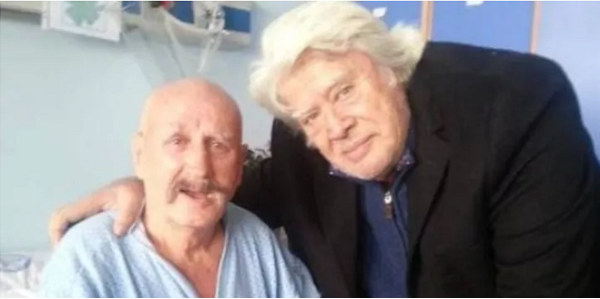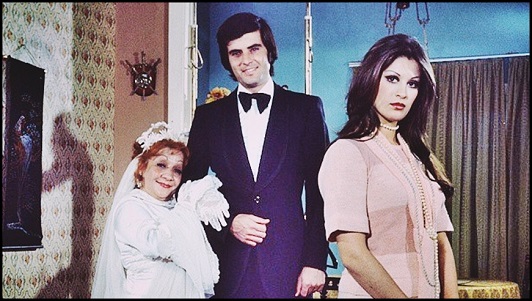Dear Erol Keskin has also passed away (age 89). Erol Bey was a unique character who had served Turkey and its theater and cinema for 70 years as an actor, director, instructor, researcher, documentary maker and screenwriter, and trained hundreds of students.
Keskin was a graduate of Istanbul Fine Arts Academy, Department of Interior Designing. His first appearance on the stage was in 1951 at the Academy of Fine Arts Theater with Sophocles’ play “Antigone”.
First, he had performed in a member of major private theaters of the period like Cep Theatre, Avni Dilligil Theatre, Kucuk Sahne, Dormen Theatre, Oraloglu Theatre, 6 o’clock Theatre, etc., then in the funded Istanbul Municipality Theater in numerous plays of every genre including “Monserrat” (Lillian Hellman), “Marat Sade” (Peter Weiss),”Mister Roberts” (Thomas Heigen & Yoshua Logan), “Stalag 17” (Donald Bevan & Edmund Trzcinski), “I Am a Camera” (John Van Druten), “Government Inspector” (Nikolai Gogol), “The Bear” (Anton Chekhov), “Desire Under the Elms” (Eugene O’Neill), “The Crucible” (Arthur Miller), “King Lear” (Shakespeare), “Antonious and Cleopatra” (Shakespeare), “Oppenheimer” (Tom Morton-Smith), “True West” (Sam Shepard), and “Troy”. He also directed many plays. Since the 1960s, he received many prestigious theater awards both as an actor and as a director.
He started cinema in the early 1960s by performing petty young men in comedies directed by late Atif Yilmaz (he was somewhat like the British legandry late Ian Holm, but with a much more serious face).
He continued cinema as an actor, scriptwriter and set designer. He also shot some documentaries. He received awards as an actor in cinema, and also received the “Best Screenwriter” award for two consecutive years at the Antalya Film Festival, when there was only one film festival in Turkey.
We worked with Erol Keskin in only two plays; he was a voice actor in “The Cat”, which I adapted from poet Behcet Necatigil and directed, and acted a minor role in “Hamlet 2001” that I concepted and directed. But we worked with him in TAL (Theater Research Laboratory) for about 5 years. He was both a colleague and a teacher for me there.

Although I didn’t volunteer for a long time, he became my instructor for Tai Chi Chuan, and many other methods of direct or indirect acting. I was not one of his very favorite students, because I was a smoker. And he would say this almost every time: “An actor should not smoke”. But one day when he was very bored, I got a lengthy compliment on a very unrelated subject: In a play he staged in Istanbul Municipality Theaters, almost all the cast resisted what he proposed as a director and did not do what he wanted deliberately. And the play was removed from the repertoire after a few staging.
At the Istanbul Municipality theater, the younger generation used to call him “Erol Abi (abi means older brother)”, respecting his age and experience, and I always called him “Erol Bey (bey means mister)”. If I paraphrase what he said “Are you aware of it? You didn’t say ‘Erol Abi’ to me even for once, you always said ‘Erol Bey’. The actors here will never be researchers in the western sense because of their Turkish style, and they will never be disciplined and never develop in the theater, but you are not like that.” Since I was not used to being highly rewarded by Erol Bey, I suddenly became like struck by lightning. But at the end he still added a “but quit smoking”.
Being a researcher was one of the most important features of Erol Keskin; he would research every subject directly related or not related to theater. For example, although it is no longer valid due to global warming, he would have known beforehand on which day it will rain, on which day will the storm break out, on which day the wind will blow and from which direction the wind will blow. After realizing this, whenever I was going to make an outdoor performance, I would go and ask Erol Bey without determining the date. He read and researched great history, anthropology, and with this feature, he was the history consultant of many historical films and TV dramas, or director-chief of art groups.
Erol Bey played one of the leading roles in “Everybody in Their Own House”, the first future film of Berlin Film Festival Grand Prix winner Semih Kaplanoglu. I watched it in a small movie theater with very few audiences, and when he started doing Tai Chi Chuan in one scene of the movie, I couldn’t help myself and laughed for a long time. As soon as I met him at the theater, I told this to Erol Bey. He was acting an old man who lived in the former USSR for a long time. He told me that the character lived somewhere in the USSR near the border with China and learned Tai Chi Chuan there.
Also, after retiring from the Municipality Theater, he was playing in “Visiting Mr. Green” (Jeff Baron), directed by Nedim Saban, at the TiyatroKare. When I told him that I compared some of his movements, such as stretching his feet while wearing his slippers, to Tai Chi Chuan movements, he said “You are exaggerating now” and told me which diseases the character had, which of these diseases affected the body and how from here to Sunday.
I want to say “Good-bye Erol Bey” to dear Erol Keskin with “Caro Nome Che il Mio Cor” from Verdi’s opera Rigoletto from French-American operatic coloratura soprano Lily Pons’ soft and flowing vocal.
This article has been written by Mehmet Atak for Sinematik Yeşilçam – May 2021












